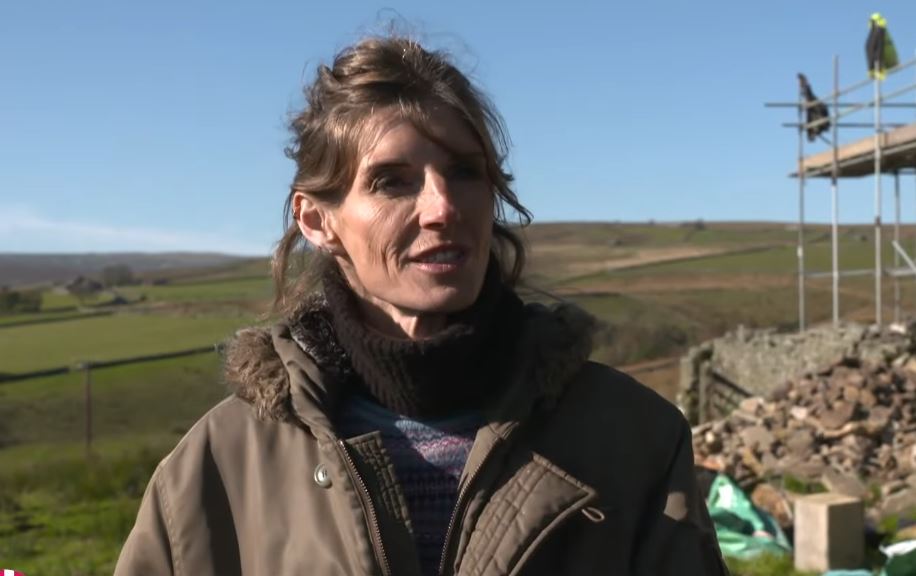Amanda Owen didn’t make a comeback to the spotlight with a viral photo shoot or a marketing campaign. Her silent return on Our Farm Next Door, on the other hand, brought about something much more moving—a subtle, obvious change that simultaneously astounded and alarmed viewers. As “The Yorkshire Shepherdess,” Amanda is well-known for her gritty authenticity and has always shown her true self. Viewers have recently begun to notice a more delicate silhouette, though, one that conveys a lot without ever saying a word.
Fans took notice of Amanda’s significantly thinner appearance during recent Lorraine and Channel 5 segments. Once purely utilitarian, her trademark farmwear now framed a significantly altered figure. Although Amanda hasn’t given any details, educated guesswork points to a loss of between 25 and 35 pounds. This is not the result of a celebrity detox or carefully planned exercise routine. It is the outcome of long days, emotional stress, and physically taxing work that is woven into each hour.
| Attribute | Details |
| Full Name | Amanda Owen |
| Nickname | The Yorkshire Shepherdess |
| Date of Birth | September 1974 |
| Place of Birth | Huddersfield, West Yorkshire, England |
| Occupation | Author, Shepherdess, Television Personality |
| Known For | Our Yorkshire Farm, Our Farm Next Door |
| Children | Nine (Reuben, Raven, Miles, Edith, Violet, Sidney, Annas, Clemmy, Nancy) |
| Former Spouse | Clive Owen |
| Notable Works | The Yorkshire Shepherdess, Adventures of the Yorkshire Shepherdess |
| Estimated Weight Loss | 25–35 pounds (unofficial) |
| Reference Link | The Sun |
Early mornings, rough terrain, and the unrelenting rhythm of farm life are the pillars of Amanda’s existence. It was more than just a physical undertaking to renovate the ancient Anty Johns cottage, with its stone walls entangled with time and tree roots. It was a reflection of the emotional decomposition she has been going through since her public divorce from Clive Owen. She has continued to raise nine children, manage Ravenseat Farm, and gracefully control public curiosity through clearly worn moments and introspective moments.
Through managing these conflicting personal and professional obligations, Amanda has inadvertently turned into a role model for innumerable women who must strike a balance between resiliency and exhaustion. Her weight loss is a visible indicator of emotional output, even if it is not motivated by vanity. Amanda’s transformation is driven by her survival instinct rather than sponsorship deals, in contrast to influencers who pose with smoothies and dumbbells.
Like Ben Fogle’s introspective journeys or Ant Middleton’s unvarnished confessions, Amanda provides something more timeless—a human model for enduring stress with perseverance. However, her narrative stands out for its unvarnished delivery. She shows everything, but she doesn’t talk much. Even though her frame gets smaller, her strength is still evident whether she is trudging through snowdrifts or dealing with family conflicts.
There have been a lot of theories and worries on the internet in recent months. Reactions range from sincere concerns to self-diagnosis, which is regrettably typical for women who are subjected to public scrutiny. However, Amanda’s metamorphosis is notable because it is cautionary rather than aspirational. It serves as a reminder that sometimes the weight that drops off is just the outward sign of battles waged day in and day out in silence.
Amanda’s story, which is grounded in reality rather than reward, emerges through each weather-worn shot and candid glance. Her admirers are inquiring about more than just her weight loss. They want to know how much weight she still has. It’s a worthwhile conversation because she’s still moving forward, not because she’s thinner.
Amanda redefines resilience by accepting her vulnerability while enduring day-to-day struggles. Deeper contemplation is encouraged by her journey, including how society views health, how media absorbs emotion, and how mothers who work are expected to handle everything flawlessly. However, it is incredibly human to falter, even for a brief moment.

